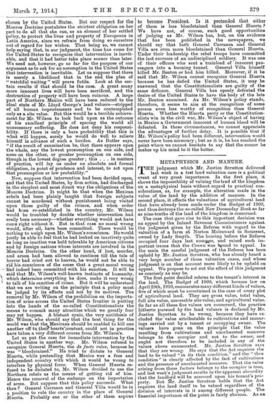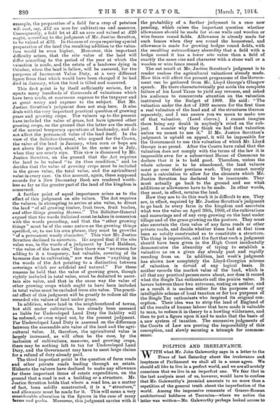METAPHYSICS AND MANURE.
THEjudgment which Mr. Justice Scrutton delivered last week in a test land valuation case is a political event of very great importance. In the first place, it
shows the impossibility of valuing the land of the kingdom on a metaphysical basis without regard to practical con- siderations, as, for example, the alteration made in the
value of the land by the addition of manure. In the second place, it affects the valuations of agricultural land that have already been made under the Budget of 1909, and thus destroys the so-called New Doomsday Book so far as nine-tenths of the land of the kingdom is concerned.
The case that gave rise to this important decision was an appeal by the Inland Revenue Commissioners against the judgment given by the Referee with regard to the valuation of a farm at Norton Malreward in Somerset, owned by Lady Smyth. The hearing before the Referee occupied four days last summer, and raised such im-
portant issues that the Crown was hound to appeal. In the main the careful judgment of the Referee has been upheld by Mr. Justice Scrutton, who has already heard a very large number of these valuation cases, and whose judgment is on that account more likely to be upheld on appeal. We propose to set out the effect of this judgment as concisely ae may be.
The first point decided relates to the tenant's interest in the land. The Budget of 1909, which became law on April 29th, 1910, enumerates many different kinds of values, five of which must be ascertained in the case of every plot of agricultural land. They are gross value, total value, full site value, assessable site value, and agricultural value.
So far as all these five values are concerned, the practice hitherto pursued by the land valuers is declared by Mr. Justice Scrutton to be wrong, because they have ex- cluded the value attributable to cultivations and manur- ing', carried out by a tenant or occupying owner. The valuers have gone on the principle that the value resulting from cultivations and unexhausted manures belongs to the occupier and not to the owner, and ought not therefore to be included in any of the
values above enumerated. Mr. Justice Scrutton save that they are wrong. He says that the Act requires the land to be valued "in its then condition," and the " then condition" is clearly affected by the fact of cultivations and the presence of unexhausted manures. That the value arising from these factors belongs to the occupier is true, and last week's judgment results in the apparent absurdity
that the landlord will be assessed upon his tenant's pro- perty. But fir. Justice Scrutton holds that the Act requires the land itself to be valued regardless of the division of interests in it among different people. The financial importance of the point is fairly obvious. As an
example. the preparation of a field for a crop of potatoes will cost, say, £12 an acre for cultivations and manures. Consequently, a field let at £1 an acre and valued at £20 ought, according to the judgment of Mr. Justice Scrutton, to he valued at £32. In the case of crops requiring special preparation of the land the resulting addition to the valua- tion would be even higher. Moreover, this important difficulty arises, that the site value of the laud will differ according to the period of the year at which the valuation is made, and the estate of a landower dying in October, when the laud is fallow, will be assessed, fur the purposes of Increment Value Duty, at a very different figure from that which would have been charged if lie had died in January, when the land is tilled and mauured.
This first point is by itself sufficiently serious, for it upsets many hundreds of thousands of valuations which have been made, at enormous expense to the taxpayer and ■ t great worry and expense to the subject. But Mr. Justice Scrutton's judgment does not stop here. It also deals with the very important practical question of growing grass and growing crops. The valuers up to the present have included the value of grass, but have ignored other growing crops, on the ground that the latter are the result of the annual temporary operations of husbandry, and do not affect the permanent value of the land itself. In the view of the Solicitor-General, who argued for the Crown, the value of the land in January, when corn or hops are not above the ground, should be the same as in July, when they are nearly ripe. This view is dismissed by Mr. Justice Scrutton, on the ground that the Act requires the land to be valued "in its then condition," and he decides that the value of growing crops must be included in the gross value, the total value, and the agricultural value in every case. On this account, again, these supposed records for a New Doomsday Book are rendered worth- less so far as the greater part of the land of the kingdom is concerned.
A further point of equal importance arises as to the effect of this judgment on site values. The Act requires the valuers, iu attempting to arrive at site value, to divest the land "of all growing timber, fruit trees, fruit bushes, and other things growing thereon." The Solicitor-General argued that the words italicized must be taken in connexion with the words preceding, and that the " other growing things" must be of the same nature as the growing things specified, or, to use Iris own phrase, they must be growths "of a permanent woody character." This view Mr. Justice Scrutton declined to entertain. He argued that if the site value was, in the words of a judgment by Lord Haldane, " the value of the bare site," then there was "no reason for adding to it a temporary, but valuable, covering of its bareness due to cultivation," nor was there "anything in the words of the Act pointing to a distinction between coverings which are artificial and natural." For these reasons he held that the value of growing grass, though rightly included in total value, must be deducted to ascer- tain site value, and that in the same way the value of other growing crops which ought to have been included in total value must be excluded from site value. The practi- cal effect of this judgment will be greatly to reduce all the recorded site values of land under gram.
In addition, where land in the neighbourhood of towns, but still under cultivation, has already been assessed as liable for Undeveloped Land Duty the liability will be reduced, or even wiped out, by the present judgment. For Undeveloped Land Duty is assessed on the difference between the assessable site value of the land and the agri- cultural value. If, therefore, the agricultural value is largely increased, as will often be the case, by the inclusion of cultivations, manures, and growing crops, there may be nothing left to tax for Undeveloped Land Duty, and the Government may have to meet large claims for a refund of duty already paid.
The third important point is the question of farm roads and other private roads leading through an estate. Hitherto the valuers have declined to make any allowance for these important items of estate expenditure, on the ground that a road is not a building or a structure. Mr. Justice Scrutton holds that where a road has, as a matter of fact, been solidly constructed, it is a " structure," and allowance must be made for it. This will mean a very considerable alteration in the figures in the case of many farms and parks. Moreover, this judgment carries with it
the probability of a further judgment in a case now pending, which raises the important question whether allowances should be made for stone walla and wooden or wire fences round fields. Allowance is already made for such fences when they are round the homestead, and allowance is made for growing hedges round fields, with the resulting extraordinary absurdity that a field with a hedge round it has a lower site value than a field of exactly the same size and character with a stone wall or a wooden or wire fence round it.
The net result of Mr. Justice Scrutton's judgment is to render useless the agricultural valuations already made. How this will affect the present programme of the Govern- ment can be gathered from Mr. Lloyd George's Glasgow speech. He there characteristically put aside the complete failure of his Land Taxes to yield any revenue, and asked his audience to concentrate attention on the valuation instituted by the Budget of 1909. He said: "The valuation under the Act of 1909 secures for the first time a real valuation of the land and of the structures thereon separately, and I can assure you we mean to make use of that valuation. (Loud cheers.) I cannot imagine there being any doubt in anybody's mind on the sub- ject. I wonder why they think we had that valuation unless we meant to use it." If Mr. Justice Scrutton's judgment is upheld on appeal, it will be impossible for the Government to use this valuation of which Mr. Lloyd George is so proud. After the Courts have ruled that the valuation does not comply with the terms of the law it is impossible even for a subservient House of Commons to declare that it is to hold good. Therefore, unless the whole scheme is to be abandoned, the laud valuers must go over their previous work. They cannot merely make a calculation to allow for the elements which Mr. Justice Serutton has declared to be inaccurate. They must actually go back to the ground and see what additions or allowances have to be made. In other words, they must, in effect, revalue the land.
How they are to do this work it is difficult to see. They are, in effect, required by Mr. Justice Scrutton's judgment to go back to every farm in the kingdom and ascertain what was the value on April 30th, 1909, of the cultivations and manurings and of any crop growing on the land under tillage and of the grass growing on the pasture. They must also ascertain the then value of any farm roads or other private roads, and decide whether these had at that time been so solidly constructed as to constitute a structure. The thing is impossible, and the fact that such a judgment should have been given in the High Court incidentally demonstrates the absurdity of trying to establish a valuation as on a given day already past and rapidly receding from us. In addition, last week's judgment has shown how completely the Lloyd-Georgian scheme of valuation is devoid of any logical basis. It neither records the market value of the laud, which is all that any practical person cares about, nor does it record what the Single Tax enthusiasts call the prairie value. It hovers between these two extremes, resting on neither, and as a result it is useless either for the purposes of any intelligible scheme of local taxation or for the purposes of the Single Tax enthusiasts who inspired its original con- ception. Their idea was to strip the land of England of all the results of human labour that have made it valuable to man, to reduce it in theory to a howling wilderness, and then to put a figure upon it and to make that the basis of a new system of taxation. The successive judgments of the Courts of Law are proving the impossibility of this conception, and slowly securing a triumph for common- sense.















































 Previous page
Previous page